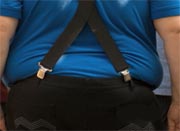
FRIDAY, Nov. 15, 2013 (HealthDay News) — Beyond slimming the waistlines of morbidly obese patients, weight-loss surgery also may help reverse the aging process in some patients, turning back the clock on a key sign of decline in the body’s cells, a small, early study suggests.
Investigators said the finding could be an unforeseen positive side effect of invasive weight-loss (bariatric) surgery for some people with cholesterol and inflammation problems. Such surgery comes in a variety options, all designed to prompt a dramatic shedding of pounds following intestinal rerouting or a reduction in stomach size.
The upshot: One year following weight-loss surgery, some patients were found to experience a notable lengthening of the ends of their genes’ tips or caps, referred to as “telomeres.” The wearing down and shortening of telomeres over time has long been viewed as a genetic indicator for aging. Meanwhile, longer telomeres have been associated with health and youthfulness.
“We know that we age on a genetic level,” said study co-author Dr. John Morton, chief of bariatric and minimally invasive surgery at the Stanford University School of Medicine. “It’s not just about wrinkles. It’s the whole system, in which our body replaces cells continuously. The more they divide over time — or the sicker you are — the more the ends get frayed. Like a cap on a shoelace.
“But now we found that some — not all, but some — obese patients who lost a lot of weight after surgery saw significant improvements in telomere length,” Morton added. “This is a pretty unique finding that we haven’t seen before.”
Morton is scheduled to present the findings Friday at Obesity Week, the annual meeting of weight-loss surgeons and other obesity specialists, held in Atlanta.
In recent years, bariatric surgery has taken its place alongside diet and exercise as a possible intervention for those struggling to lose weight, particularly among the morbidly obese. Morbidly obese is defined as those people with a body-mass index (BMI) of at least 40. BMI is a measurement of body fat based on a ratio of height to weight.
For their current effort, Morton and his colleagues focused on 51 bariatric surgery patients, with an average BMI of about 44. On average, the patients were just shy of 49 years old, and more than three-quarters were women.
The researchers saw that by the one-year mark following surgery, patients had lost an average of 71 percent of so-called “excess” weight.
Such dramatic weight loss appeared to have a positive impact on key measures of health. For example, a year after surgery, patients’ levels of C-reactive protein (CRP) — a sign of inflammation — had plummeted by more than 60 percent on average. Those who previously had high levels of so-called “bad” LDL cholesterol also saw their numbers drop. Meanwhile, fasting insulin levels decreased to just a quarter of what they had been pre-surgery, suggesting a lower risk for type 2 diabetes.
But blood tests conducted at three, six and 12 months post-surgery revealed that, among the group as a whole, telomere length did not change all that much.
However, patients who had relatively high levels of both CRP and LDL cholesterol before the surgery did see a significant lengthening of their telomeres, when compared to those with low CRP and LDL levels pre-surgery.
“All the patients lost weight and showed big improvements in cardiac health,” Morton said. “But those who had very high inflammation and bad cholesterol before surgery were found to have longer telomeres following surgery, when inflammation and bad cholesterol went down. And the lengthening wasn’t so subtle. We’re talking about real, significant improvements.”
“What this suggests is that some bariatric surgery patients are metabolically receptive to positive change that can improve markers for aging at a genetic level,” he said.
Morton said more longer-term research is planned.
Joseph Lee, associate professor of clinical epidemiology at the Columbia University Mailman School of Public Health, in New York City, reacted to the current findings with a degree of skepticism.
“Number one, it’s a very small sample of patients,” said Lee, a human geneticist. “It’s difficult to make too much out of this. And number two, they measured telomere length within just 12 months of surgery. Now some people show telomere lengthening with age. Even some cancer patients show telomere lengthening. So is what they’re seeing a true biological effect resulting from radical surgery, or is it due to a certain amount of experimental error?
“It’s a very complicated issue, and I don’t think it’s really clear what this finding means,” Lee said. “It’s certainly an interesting concept. But it remains to be seen in follow-up, with a larger sample over a much longer period of time, what’s really going on.”
Because this study was presented at a medical meeting, the data and conclusions should be viewed as preliminary until published in a peer-reviewed journal.
More information
For more on weight-loss surgery, visit the U.S. National Library of Medicine.
Copyright © 2025 HealthDay. All rights reserved.

